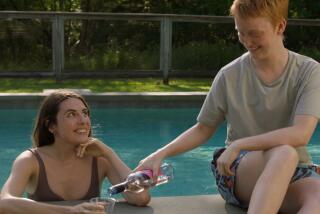MOVIE REVIEW : ‘SUMMER HEAT’ SEDUCES AS IT STAGNATES
The artists of “Summer Heat” (UA Egyptian, Cineplex Odeon Showcase) have good reason to be proud. This story of a young woman’s struggle between duty and consuming attraction looks beautiful: Its 1937 North Carolina tobacco-country settings, its costumes and particularly the photography are marvelously evocative--authentic-looking without the stigma of quaintness. The film’s director, relative newcomer Michie Gleason, has a way of getting the best out of good actors, and Lori Singer, Anthony Edwards and Bruce Abbott give strong, thoughtfully detailed performances.
But the same Gleason--as screenwriter/adapter of Louise Shivers’ poetic novel “Here to Get My Baby Out of Jail”--has undercut the project crucially. Even though she has stuck closely to Shivers’ first-person novel (probably too slavishly), the driving sense of where this Southern mood piece is going is missing.
In the film’s final minutes Gleason will give us an answer: It’s in the spirited emergence of a quiet Southern “girl,” who has never in her life said no to anyone--much less to a husband, father or lover--to take a hand in her own life after it has taken a tragic, irrevocable turn.
But the end of the movie is the wrong place to understand this. The film needs a tighter edge to it, a fevered rise and fall to go with the hot excesses of its illicit lovers. It can’t lollygag along in the way it does, meandering to a conclusion. And it needs a keener sense that it is the story of a maturation.
“Summer Heat” is narrated by its central character, Roxy Walston, as a much older woman, a clumsy device that also takes any suspense out of the trial that ends the film. (That’s Dorothy McGuire’s voice as the narrator.) It begins with the courtship of 17-year-old Roxy (Lori Singer), shy and unworldly, over the grave of the beloved grandmother who raised her. Roxy is wooed by Aaron (Anthony Edwards), a serious, decent, unimaginative boy only a year older than she, who marries her and moves her to the isolation of a struggling tobacco farm some miles out of their small North Carolina town.
They’ve been married about five years and have a curly-haired 2-year-old daughter, Baby, by the time an enigmatic young Depression drifter, Jack Ruffin (Bruce Abbott), becomes the third side of the triangle. He’s been sent to help out on the place by Roxy’s father (Clu Gulager), who owns the town’s funeral home and is something of a soft touch for the jobless young men of the area.
Dark-haired and insinuating, Ruffin instantly confuses and fascinates Roxy with his directness and appreciation of her. At the same time, he works assiduously to become her husband’s companion as well as his hired hand. These sections: the growing electricity between Ruffin and Roxy, her husband’s patronizing treatment of her, the camaraderie between the two men--playing guitar-mandolin duets by the firelight at the end of a long work day--are some of the film’s most memorable scenes.
There is also a writer’s good ear: “You look like a cat under a collard,” an aunt says about Baby, as she tries on her daddy’s felt hat. And there is a generous portrayal of rural Southern life by a director who herself comes from Virginia.
From “Summer Heat” you draw a genuine and lovely sense of place, of community, and--in the fine performances of Gulager and the splendid Kathy Bates as his second wife--a sense of the continuity of family that is so intensely Southern. It’s the film’s real successes that make its intrinsic weaknesses all the more painful.
The picture is too novelistic. Author Shivers’ device of having Roxy’s grandmother reappear isn’t well worked out on film, and a lot of Roxy’s childhood memory details emerge as murky and confusing. To go with its dark conclusion, “Summer Heat” needs a strong morality: the novel’s suggestion that all her life long, Roxy will be “tending two graves.” The film almost overlooks those two graves in its pride in its heroine’s growing sense of self--a terribly unsatisfying equation.
Its deadly triangle of actors is fine. Singer, more exquisite than ever in cinematographer Elliot Davis’ lenses, is subdued and somnambulistic as the unawakened Roxy, and all sweet, unbridled sexuality with the appearance of Jack Ruffin. Abbott, beautifully cast as the persuasive, mercurial Ruffin, is as mysterious and, eventually, as dangerous as the role demands. And Edwards, almost unrecognizable as “Top Gun’s” loud-mouthed Goose, is perfect as the strong, quiet anchor to the action.
Gleason needs to take far more risks as an adapter, but undeniably she can direct. Producer William Tennant has provided her with a fine technical crew: cinematographer Davis (who shot Gleason’s first film, “Broken English,” and the high-style “Vamp”); costume designer Anthony Marando and costume supervisor Fiona Spence; production designer Marcia Hinds, editor Mary Bauer and composer Richard Stone.
“Summer Heat” (rated R for nudity and adult themes) still emerges on the minus side of the ledger, but put it down as an interesting, beautifully detailed and engaging piece of work, however flawed, and look for the further work from Gleason’s directorial hand.
‘SUMMER HEAT’ An Atlantic Entertainment Group presentation. Executive producers Thomas Coleman, Michael Rosenblatt. Producer William Tennant. Director Michie Gleason. Screenplay Gleason, based on the novel “Here to Get My Baby Out of Jail” by Louise Shivers. Camera Elliot Davis. Music supervisor Steve Tyrell; original music by Richard Stone. Editor Mary Bauer. Production design Marcia Hinds. Art director Bo Johnson. Costume design Anthony Marando, costume supervisor Fiona Spence. Sound E. Lee Haxall. With Lori Singer, Anthony Edwards, Bruce Abbott, Kathy Bates, Clu Gulager.
Running time: 1 hour, 22 minutes.
MPAA-rated: R (persons under 17 must be accompanied by parent or adult guardian).
More to Read
Only good movies
Get the Indie Focus newsletter, Mark Olsen's weekly guide to the world of cinema.
You may occasionally receive promotional content from the Los Angeles Times.










